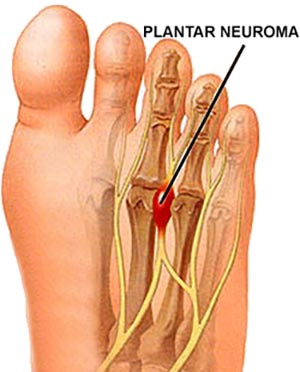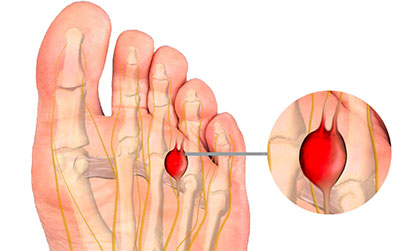Neuromas (Nerve Tumors)
 A neuroma is an abnormal growth of nerve tissue that can cause intense burning pain and numbness in your foot. Neuromas usually form near the base of the toes and are due to the metatarsal bones rubbing and squeezing the nerve. Neuromas are benign, non-cancerous growths and can be easily treated at the office of your New York foot doctor. The pain is usually worse in the winter when we are wearing narrow boots and regresses during the summer months when we are wearing sandals. In severe cases, you can feel the knot of nerve tissue pop upward when you place your foot on the ground. All symptoms should always be evaluated with a thorough consultation and examination by your podiatrist for an accurate diagnosis and treatment plan to exclude any underlying serious conditionNeuromas usually are the most painful while in high heels or any narrow shoes that squeeze your toes together. Burning pain under the forefoot and numbness in the toes are the most common symptoms.
A neuroma is an abnormal growth of nerve tissue that can cause intense burning pain and numbness in your foot. Neuromas usually form near the base of the toes and are due to the metatarsal bones rubbing and squeezing the nerve. Neuromas are benign, non-cancerous growths and can be easily treated at the office of your New York foot doctor. The pain is usually worse in the winter when we are wearing narrow boots and regresses during the summer months when we are wearing sandals. In severe cases, you can feel the knot of nerve tissue pop upward when you place your foot on the ground. All symptoms should always be evaluated with a thorough consultation and examination by your podiatrist for an accurate diagnosis and treatment plan to exclude any underlying serious conditionNeuromas usually are the most painful while in high heels or any narrow shoes that squeeze your toes together. Burning pain under the forefoot and numbness in the toes are the most common symptoms.
”
★ ★ ★ ★ ★He was incredible! He was one of the kindest doctors and had really amazing bedside manner. He saw me immediately (there was no wait) and I never felt rushed at all. He was very intelligent and skilled in helping me with my problem and was very reassuring to all of my concerns. I highly recommend him if you need a podiatrist! 🙂
Symptoms Of Neuromas
Neuromas usually are the most painful while in high heels or any narrow shoes that squeeze your toes together. Burning pain under the forefoot and numbness in the toes are the most common symptoms. The pain feels like:
- A burning sensation
- A tingling
- Numbness on the balls of your feet
- Swelling between your toes
- Pain in the ball of the foot
- You have a stone in your shoe
- Feeling of socks bunched up in your shoe
 Neuromas usually form near the base of the toes and are due to the metatarsal bones rubbing and squeezing the nerve.
Neuromas usually form near the base of the toes and are due to the metatarsal bones rubbing and squeezing the nerve.
You may feel much better when you stop walking, take your shoes off and rub the soreness between your toes. But it is important to visit a podiatrist in NYC to ensure the growth is not something more serious.
The pain can radiate to include much of your foot causing you to put more weight on other areas of your foot which can create more problems. A neuroma is relatively easy for your New York foot doctor to treat. So if you’re suffering from any of these symptoms, consult an NYC podiatrist.
All symptoms should always be evaluated with a thorough consultation and examination by your podiatrist for an accurate diagnosis and treatment plan and to exclude any underlying serious condition.
Causes of Neuroma
Neuromas result in part by increased pressure to the forefoot. Increased forefoot pressure can develop from a number of causes but heeled shoes are one of the top culprits. Best-rated podiatrists in New York City will recommend you to take a break from high-heeled shoes if you are having pain. But at Manhattan foot specialists we have conservative options that help relieve your pain if you need to continue wearing heels for work. Heels higher than two inches can cause neuromas due to the pressure placed on your toes.
Because of the types of shoes worn, women are about 10 times more likely to get neuromas than men, according to the Cleveland Clinic. But a number of other causes may contribute to the nerve condition in your toes, including:
- An injury that results in inflammation and swelling in the sensitive nerve area
- Other foot deformities like high arches or flat feet
- Jobs that place constant pressure on your toes
- Hammer toes
- Bunions
- Participation in sports that involve intensive running
- Using an elliptical machine over time
- Playing tennis
Prevention Is Key
Visit a good podiatrist in Manhattan to find out more about prevention of foot pain. It is best you to save your spiked heels for those rare occasions when you’ll be sitting most of the time and walking very little. We recommend wearing walking shoes when you travel and carrying heels in a bag to change into once they reach your destination.
In addition to wearing shoes with sufficient room for your toes to spread out, avoid foot pain and complications by wearing shoes appropriate for each sport you play. Good athletic shoes should have sufficient padding for the balls of your feet as well as a wide toe box.
Diagnosing a Neuroma
It’s always best to visit a New York foot doctor as soon as you begin to feel foot pain, especially when it comes on more often and seems to get worse despite resting and changing your shoes. During your appointment, podiatrists first examine your foot and puts pressure on different places on your foot to help determine the location of your pain.
X-rays can help your foot doctor rule out other causes of your foot pain, such as arthritis or stress fractures. A scan using ultrasound technology or an MRI is sometimes required to definitively diagnose a nerve problem. Once your podiatrist confirms that you have a neuroma, treatment can begin.
Treatment Options Exist
A good podiatrist in NYC always tries conservative treatments before suggesting more invasive measures. Your New York City foot doctor encourages to try some simple recommendations when treating a Morton’s Neuroma:
Changing your shoes for more supportive footwear with a wide toe box, sufficient insoles and soles that are shock absorbent. If you wear tied shoes, keep them loosely laced.
- Using ice on the inflamed toe area when it becomes swollen.
- Steroid injections
- Custom orthotics
- Changing your shoes to more supportive shoewear with a wide toe box, sufficient insoles and soles that are shock absorbent,
- Inserting shoe pads that you can get over the counter to pad your painful toe area.
- Resting more often when you have flare-ups.
It addition to home care it is important to always visit a foot doctor to ensure a proper diagnosis and treatment. Your foot doctor will explain your treatment options which may include:
- Local anesthetic cream
- Corticosteroid shots
- Oral anti-inflammatory medications
- Nerve ablation under ulstrasound- Minimally invasive technique that is performed under ultrasound using radiofrequency waves to destroy a nerve.
Your foot doctor may recommend orthotic foot inserts or special shoes designed specifically for the shape of your feet. Orthotics with a built in neuroma pad takes the pressure off your nerve, giving it time to heal while you can continue walking.
Surgery is the last option for treating neuromas, and it typically involves removing the painful nerve tissue in a procedure called a neurectomy. A less invasive procedure podiatrists in NYC offer is nerve ablation under ultrasound. In this procedure a radiofrequency needle is used to pass electric current to the nerve. This prevents the nerves pain signals from reaching the brain and is an effective treatment for a neuroma. This procedure is minimally invasive and is performed under ultrasound guidance.
Neuromas should always be evaluated with a thorough consultation and examination by your local foot doctor for an accurate diagnosis and treatment plan to exclude any underlying serious condition.
Your Prognosis
Surgery is effective for treating neuromas 75 to 85 percent of the time. Nerve ablation is a minimally invasive technique which also has great results. In some cases the nerves can re-grow after surgery and form a painful nerve growth called a stump neuroma. All risks will be discussed during your office visit. Recovery from podiatric surgery typically runs from one to two weeks, after which you should have no trouble walking again.
Following surgery your foot doctor in NY will put you in a surgical shoe for 1-2 weeks. If you have stitches you will be in a surgical shoe until the stitches are removed which is usually at 2-3 weeks.
Important Reminder: This information is only intended to provide guidance, not definitive medical advice. Please consult your foot doctor about your specific condition. Only a trained, experienced board certified podiatrist or foot specialist can determine an accurate diagnosis and proper treatment.
Do you have any questions about Neuromas (Nerve Tumors) treatment in NYC? Would you like to schedule an appointment with an internationally recognized, top rated NYC Podiatrist and foot doctor at New York City Podiatry? Please contact our office for a consultation.
In The Press

Call now to make an appointment with our award winning, board certified NYC podiatrists regarding your health. We look forward to seeing you!
book online now (212) 389-9918(212) 389-1886 Podiatrist (Midtown) 51 East 25th Street, Ste 451, NY 10010
(212) 389-1887 Podiatrist (Union Square) 55 W 17th St Ste 106, NY 10011
(212) 378-9991
